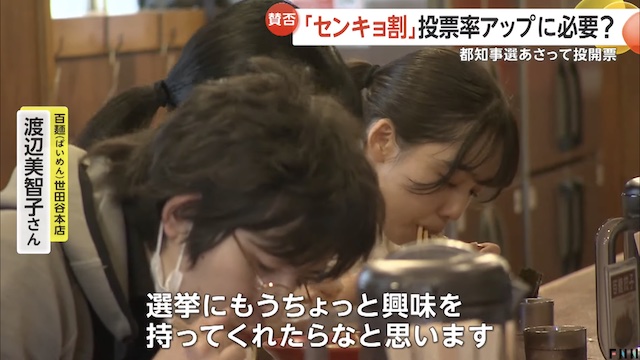TOKYO, Jul 06 (News On Japan) - The Tokyo gubernatorial election, with voting on July 7, has sparked a debate over the 'Senkyo-Wari' campaign, which offers discounts and services at participating stores upon presenting a voting certificate, aimed at boosting voter turnout. Approximately 250 establishments, including ramen shops, cafes, and beauty salons, are participating in Tokyo.

Public opinion on 'Senkyo-Wari' is divided. One person said, 'I think it's great if it increases voter turnout. I haven't voted before and didn't plan to, but if I had known about this, I might have gone.' Another remarked, 'If people vote without proper consideration just for discounts, it defeats the purpose.'
When asked about 'Senkyo-Wari,' early voters had mixed reactions. One individual said, 'I didn't know about it. Ideally, voting should be done without such incentives.' Another commented, 'I was unaware of it. If such a campaign exists, it might encourage more people to vote.'
A ramen shop offering free toppings or eggs for about five years through 'Senkyo-Wari' aims to spark interest in elections. Michiko Watanabe from Paimein Setagaya Main Store said, 'I hope people will think, "Lucky! There's this kind of service if I vote," and take more interest in elections.'
Some bakeries have reported customers using 'Senkyo-Wari.' A customer said, 'When I asked if a photo was acceptable proof, they said yes. Knowing about such offers might encourage more people to vote.'
Shōtarō Satō, President of the Election Discount Association, which organized 'Senkyo-Wari,' emphasized its significance. 'We aim to encourage non-voters to take their first step and remind regular voters to participate despite their busy schedules.'
However, concerns about potential benefits to specific candidates or vote-buying have been raised. Satō responded, 'After consulting with lawyers and election officials, we established strict rules to ensure compliance with the Public Offices Election Act.'
The Ministry of Internal Affairs and Communications, overseeing the election, stated that 'Senkyo-Wari' does not pose immediate legal issues and that improving voting conditions is key to enhancing turnout.
The Tokyo gubernatorial election voting is set for July 7.
Source: FNN















